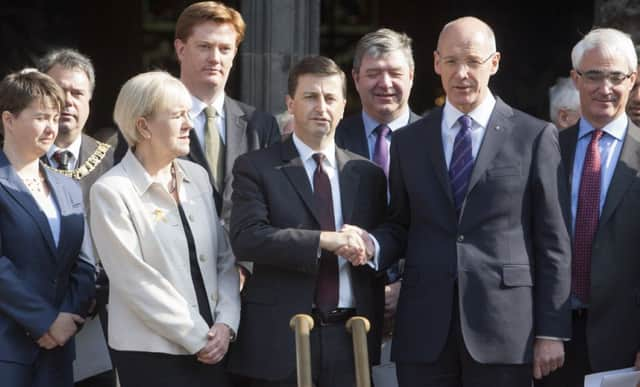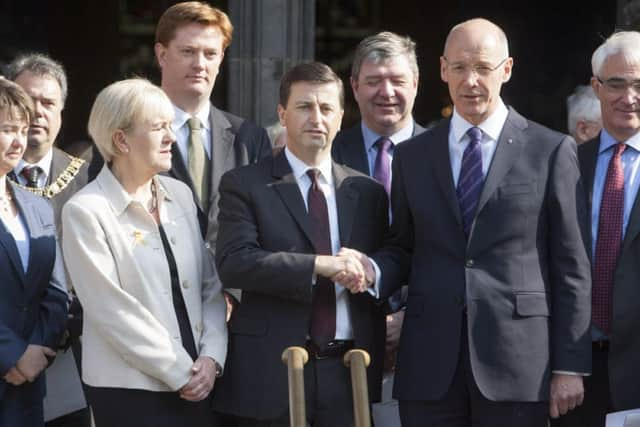Better together: Indyref opponents unite in Church


Urging the nation to come together in the wake of last week’s poll, Kirk leader the Rt Rev John Chalmers admitted there would be no “quick fix” for the country after independence was rejected by voters last week.
Speaking at a special service of reconciliation in Edinburgh, he said the nation had to find a way of “harnessing” the energy of those who had campaigned in the referendum and said people should not be “defined” according to how they had voted.
Advertisement
Hide AdAdvertisement
Hide AdSenior politicians from all parties attended the service in St Giles’ Cathedral on the Royal Mile, with the 1,000-capacity building packed out with members of the public.


Neither First Minister Alex Salmond, nor his deputy Nicola Sturgeon were present, but the Scottish Government was represented by finance secretary John Swinney. The congregation also included Labour MP Alistair Darling who led the Better Together campaign, Scottish Secretary Alistair Carmichael, Scottish Tory leader Ruth Davidson, Scottish Labour leader Johann Lamont and Scottish Liberal Democrat leader Willie Rennie.
The service closed with the reading of a pledge of unity by the rival politicians to “commit ourselves, to work for the people of Scotland, uniting to build a better society, grounded in the values and ideals we share”.
Plans for the post-referendum reconciliation service had been announced in May, shortly before the Kirk’s annual General Assembly, which also featured a special referendum debate, with the aim of “healing divisions and building the future together”.
The Rt Rev Chalmers told the congregation yesterday: “After such a momentous time, this is a time to unite and a time to walk together.
“The untold energy of people who love Scotland and care about its future has been used up on opposite sides of this debate. Now we have to find a way of harnessing all of that energy so that it can be used on the same side.
“Post-referendum, there are those who are elated, or at least relieved, and there are those who are desperately disappointed. ‘Gutted’ is the word that I have heard used frequently. Feelings like these will take time to heal. I want no one to think that I think that there is a quick fix or an easy dusting down.
Advertisement
Hide AdAdvertisement
Hide Ad“For some, this referendum has been about national identity. For us all, it has been about self-identity and that is about as close to the soul as it gets.
“So recovery and healing is a soul-searching matter and for me, that is a deeply spiritual matter – so no quick fix. Instead, it will take a force of magnanimity and graciousness to restore equilibrium to both nation and individuals.”
The Rt Rev Chalmers added: “Today and in the weeks to come Scotland needs magnanimity all round and it needs a process for shaping our future which allows every voice – the 45 per cent as well as the 55 per cent – not just to be heard but to be listened to.
“This process has engaged those who have otherwise been disengaged and we cannot allow that engagement to evaporate.
“Ordinarily, no one remembers those who come second. But that must not happen in the context of what has been the most important, most intense and most significant race that any of us has seen in our time and in our country.
“Somehow we have to line up now, hold hands and build the future together.”
SEE ALSO